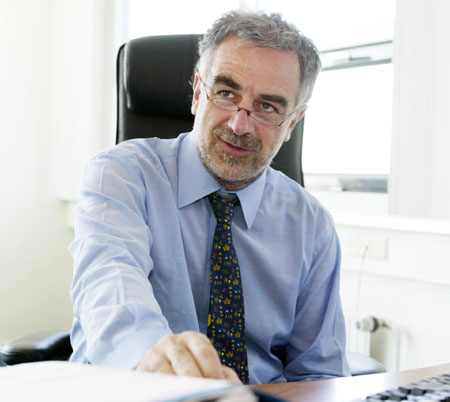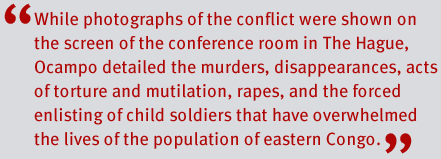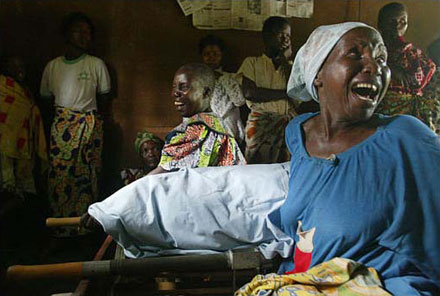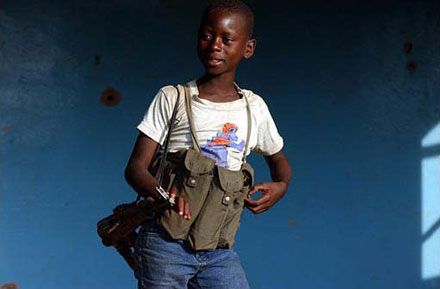|
| Relatives
grieve next to the body of seventy-year old Samuel Unega Saturday,
May 31, 2003, in Bunia, Congo. Unega died from machete wounds
inflicted by tribal fighters. The Chief Prosecutor of the International
Criminal Court has indicated that the Ituri region, where Bunia
is located, may be the focus of his first official investigation.
© Karel Prinsloo | AP |
In
the four months since taking up his post, the Chief Prosecutor of
the International Criminal Court, Luis Moreno Ocampo, has hinted
at the possible area of his first investigation, and given a broader
indication of how he intends to approach his work.
In
a speech to the 2nd Assembly of State Parties in New York on September
8, Mr. Ocampo suggested that the Democratic Republic of Congo should
refer possible crimes in Ituri to his office. Already, on July 16,
2003, the chief prosecutor had announced his intention to closely
follow the situation in Ituri, a war-torn region in the eastern
part of Congo. By announcing that he was looking into the conflict
there, which could well provide the first case before the new international
court, Ocampo gave the clearest indication yet of the wider judicial
policy he plans to follow.
 |
Chief Prosecutor Luis Moreno Ocampo sits in his office at the
International Criminal Court in The Hague, Netherlands, Tuesday
July 15, 2003. (AP Photo/ Fred Ernst) |
An Urgent Situation
In the eastern part of the Democratic Republic of Congo, a region
rich in natural resources located on the borders of Rwanda and Uganda,
war has been raging since 1996. It is an “urgent” situation,
according to the chief prosecutor; relying on reports from international
and non-governmental organizations, he estimated that 5,000 crimes
may have been committed in Ituri since July 1, 2002, the date on
which the International Criminal Court gained the authority to pursue
cases against the perpetrators of genocide, crimes against humanity,
and war crimes.
The decision to open an investigation into events in Ituri was the
result of six communications to the Prosecutor’s Office, from
both human rights organizations and victims’ groups, of which
one had been sent by mail directly from Congo. In a press conference
on July 16, while photographs of the conflict were shown on the
screen of the conference room in The Hague, Ocampo detailed the
murders, disappearances, acts of torture and mutilation, rapes,
and the forced enlisting of child soldiers that have overwhelmed
the lives of the population of eastern Congo – making it clear
that no judicial sophistry would be required to establish that the
crimes involved were serious enough to reach the threshold for international
attention.

The chief prosecutor, who started work on June 16, said he hoped
to deter the commission of further crimes in the region – though
he also spoke cautiously of the importance of investigation and
analysis before the allegations could be verified. In any case,
before launching an official investigation or filing charges, Ocampo
is obliged first to reach a judgement about whether the Democratic
Republic of Congo has the judicial capacity and the political will
to bring the cases to trial itself. If the answer to this question
is no, he must then convince the preliminary chamber of the court
that there is enough evidence for his own investigation to go forward.
That is, unless Congo or other “African or Western countries
that have taken a role in the peace process as well as other States
Parties” officially refer the case to the court, as the chief
prosecutor stated in his address to the representatives of states
parties in early September.
Attacking the Roots of Evil
Whichever scenario is followed, the procedure will be lengthy, but
the case of Congo has already shed some light on the judicial priorities
of the chief prosecutor. Beyond the specific facts of this case,
Luis Moreno Ocampo has begun to make clear the outlines of the long-term
approach that he will follow. At its heart is the idea of going
after those on the highest level who bear ultimate responsibility:
the planners of crimes – political and military decision-makers
– and those who are in effect their accomplices – the
people who provide the financial or material resources that enable
the crimes to be committed.
|
A
very small child soldier who would not give his age to journalists
in an ethnic Hema militia camp near Bunia in the Democratic
Republic of Congo, June 16, 2003. © Stephan Morrison
| EPA
|
“The fighting taking place in Ituri seems to be the outcome
of ethnic strife and of the struggle for local power, intertwined
with national or regional conflicts,” Mr. Ocampo argued in
July, and “all of these aspects of the situation are fuelled
by the way natural resources are exploited.” According to the
Diamond High Council in Antwerp, illegal diamond exports from the
Democratic Republic of Congo are worth around 800 million euros
a year. By focusing on this trade, the chief prosecutor said he
hoped to get to the root of the evil, attacking the sinews of the
conflict: “Investigation of the financial aspects of the alleged
atrocities will be crucial to prevent future crimes and for the
prosecution of crimes already committed.” In other words, the
chief prosecutor aims to dismantle the entire infrastructure that
supports the commission of crimes against humanity. Furthermore,
by highlighting the role of those who are economically complicit
in the conflict, the chief prosecutor implicitly refutes any criticism
of the court for inappropriate discrimination in only pursuing investigations
against African suspects.
There are “links between the activities of some African, European
and Middle Eastern companies and the atrocities taking place in
the Democratic Republic of Congo,” Mr. Ocampo stated. Illegal
exploitation of resources, arms trafficking: the chief prosecutor
is not mincing his words. Even if there is not yet any admissible
proof of the fact, he implied, those responsible for this traffic
are making use of the international banking system. In the case
of Ituri, Ocampo also pointed to the involvement of organized criminal
groups from Eastern Europe. According to him, “their activities
allegedly include gold mining, the illegal exploitation of oil,
and the arms trade.” He seems to be hoping for a big increase
in judicial cooperation against international financial crime.

An
Emphasis on Cooperation
In his address to the Assembly of States Parties, the chief prosecutor
explicitly proposed an exchange of information: “National investigative
authorities may pass to the Office [of the Prosecutor] evidence
of financial transactions which will be essential to the Court’s
investigations of crimes within the Court’s jurisdiction; for
its part, the Office may have evidence of the commission of financial
crimes which can be passed to national authorities for domestic
prosecutions.”
Cooperation seems to be Ocampo’s watchword. His aim appears
to be to invite the support of all countries that have taken a role
in the peace process, arguing that groups divided by the conflict
– who might be wary of prosecutions at each other’s hands
– could come together in backing an independent and neutral
investigation by the International Criminal Court.
The situation in Ituri also allows the chief prosecutor to reassure
those who are worried that the Court will abuse its power by pursuing
politically motivated cases. Opening an investigation into crimes
committed in the east of Congo permits him to avoid any direct challenge
to an established national government. The war there is now being
fought between rival militia and insurgent groups against the background
of peace negotiations and an outside intervention authorized by
the United Nations. And in the country’s capital, Kinshasa,
the new transitional government has stated loud and clear its hope
of putting a stop to the massacres.
--Translated by Anthony Dworkin
Stéphanie
Maupas reports from The Hague for Le Monde.
Back
to Top
|







